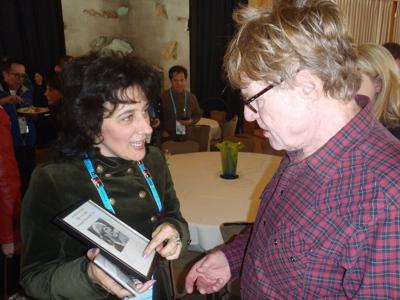To Julia Ivanova, Robert Redford wasnŌĆÖt just a Hollywood icon ŌĆö he was a passionate champion of independent film whose advice continues to guide her career as a Canadian director.
Ivanova met Redford when her documentary ŌĆ£Family Portrait in Black and WhiteŌĆØ premiered at the Sundance Film Festival that the actor helped establish in Salt Lake City.┬Ā
ŌĆ£He was very warm and approachable, with lots of interest and respect for independent filmmakers who are just emergingŌĆØ recalls Ivanova.
ŌĆ£He respected young energy because young energy changes the world. The decisions are made by the older generation, but the changes come from younger generations. I think thatŌĆÖs why Robert was very young in the way he saw the world and the way he was thinking. He spent time talking with every young filmmaker separately at Sundance because he saw the future.ŌĆØ
Redford died Tuesday at age 89.
Redford was one of HollywoodŌĆÖs most bankable stars of the 1960s and ŌĆÖ70s, with classics including ŌĆ£The CandidateŌĆØ and ŌĆ£All the PresidentŌĆÖs Men.ŌĆØ He later won an Oscar for directing 1980ŌĆÖs ŌĆ£Ordinary PeopleŌĆØ and cemented his legacy by founding the Sundance Institute and Film Festival, which gave independent filmmakers a vital platform.
The Moscow-born, Vancouver-based Ivanova says the Sundance competition selection of ŌĆ£Family Portrait in Black and WhiteŌĆØ ŌĆö about a Ukrainian woman who adopts 17 mixed-race orphans ŌĆö changed the course of her career.┬Ā
ŌĆ£The fact that it was embraced by Sundance was a stamp of quality, which led to other festivals inviting the film. They took a risk and gave us a venue to show a film that might never have found an audience otherwise.ŌĆØ
SheŌĆÖs among several Canadian filmmakers who used Sundance as a launchpad for their careers, including Denis Villeneuve with 2000ŌĆÖs ŌĆ£Maelstr├Čm,ŌĆØ Sarah Polley with 2006ŌĆÖs ŌĆ£Away From HerŌĆØ and Matt Johnson with 2013ŌĆÖs ŌĆ£The Dirties.ŌĆØ
Ivanova says she and Redford shared a personal connection: her father had been a programmer at the Moscow International Film Festival, and she showed the actor a photo of him with her dad from 1982.
She recalls Redford gathering directors in competition during a private lunch and sharing advice that altered her perspective on filmmaking. He spoke about the hurdles he faced in releasing 1972 western ŌĆ£Jeremiah Johnson,ŌĆØ which he starred in, after studios dismissed it as too difficult to market. ŌĆ£Redford said, ŌĆśThis is a love story and a Western at the same time, and the studio said, ŌĆśThat’s the problem,ŌĆÖ” she says.
ŌĆ£He was grieving because he loved the film and had a lot of hope for it.ŌĆØ
The film initially flopped, but RedfordŌĆÖs insistence on targeting smaller towns where audiences understood its themes eventually turned it into a classic.
ŌĆ£He emphasized the importance of word of mouth. The wisdom Robert shared about the importance of efforts in publicity and marketing helped me understand the importance of reaching out to the right audience for each film you are making.ŌĆØ
That lesson stuck. And more than a decade later, Ivanova is making a documentary called ŌĆ£UntamedŌĆØ about a guardian of wild horses in Alberta ŌĆö inspired in part by the vast landscapes she fell in love with while watching ŌĆ£Jeremiah Johnson.ŌĆØ
Beyond his stardom, Ivana believes RedfordŌĆÖs legacy will lie in the way he backed challenging films and used Sundance to amplify them.
ŌĆ£If we remember what films he played in as an actor, there were so many serious political ones and he carried that into Sundance with topics that he wasn’t afraid to tackle,ŌĆØ she says.
ŌĆ£He would challenge authorities in the U.S. by choosing films that would criticize the system of prison; take on race issues; the environment. He gave a bigger platform to those topics and brought them to a mainstream audience.ŌĆØ
This report by The Canadian Press was first published Sept. 17, 2025.



























To join the conversation set a first and last name in your user profile.
Sign in or register for free to join the Conversation